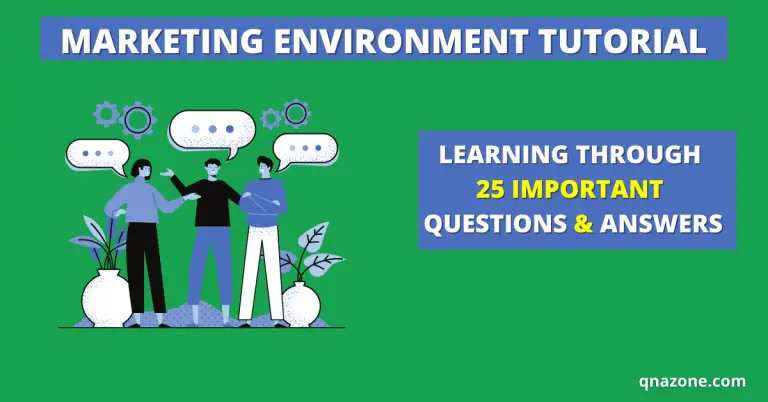35 Important Product Distribution Channel Questions and Answers [With PDF]
The 8th chapter of our marketing learning course is “Product Distribution Channel.” In this article, we’ll learn the 35 most important product distribution channel questions and their answers.
It will assist you in quickly learning what a distribution channel is, how it works, the importance or necessity of distribution channels, the various types of distribution channels, what factors influence the decision to design a distribution channel, the roles that middlemen play in distribution channels, and much more information.
By reading this post, you can quickly get ready for marketing courses as well as other competitive exams like vivas, job interviews, and school and college exams.
So let’s get started.
Product Distribution Channel Questions and Answers
The 35 most important product distribution channel questions and answers are as follows:
Question 01: What is a distribution channel?
Answer: A distribution channel is a group of businesses that work together to make it possible for consumers or business customers to use or consume a good or service.
Question 02: What characteristics do distribution channels have?
Answer: The following are the characteristics of the distribution channels:
- Distribution channels serve as a link between customers and manufacturers,
- The product’s ownership is transferred through the distribution channel.
- Distribution channels make use of a variety of delivery methods for each individual product;
- The distribution channel has an effect on all aspects of marketing; and
- A distribution channel is a group of middlemen.
Question 03: What are the objectives of distribution channels?
Answer: The following are the important objectives of distribution channels:
- Create Place Utility
- Make the product available.
- Increase sales
- Reduce distribution costs.
- Increase the span of service
- Achieve customer loyalty
- Ensure the quick delivery of products
- Enhance business coordination
- Increase competition
- Increase customer satisfaction
Question 04: What are the functions of distribution channels?
Answer: The important functions of distribution channels are as follows:
- Collect the goods according to the demand of the buyers, deliver the goods to the buyers at the right time, and coordinate the supply with the demand for the goods.
- finding and contacting potential customers.
- Intermediaries learn about the market by doing research and watching how things work. They then share this information with both sellers and buyers.
- Important marketing functions like product transportation and warehousing are performed through the distribution channels.
- The distribution system supports important business functions by providing money to producers and consumers.
- Members of the distribution channels bear different types of business risks. Some of the most important ones are product transportation risk, product storage risk, product demand risk, supply coordination risk, the risk of accidents, etc.
Question 05: Why is it necessary to have distribution channels in the case of a business?
Answer: Distribution channels are an extremely important component of any successful business. because there are many different kinds of roadblocks that can be seen along the path that the product takes from the producer to the consumer.
A time barrier, a spatial barrier, a financial barrier, a risk barrier, an ownership barrier, and others all fall into this category.
These barriers are removed by middlemen who are located in the distribution system and include wholesalers, agents, brokers, and retailers, amongst others.
It is possible to conclude that the implementation of a distribution channel is the primary requirement for removing all of the obstacles that are seen in the field of trade.
Question 06: What are the different types and levels of distribution channels?
Answer: According to the stages or levels of the distribution channel, the distribution channel is basically of two types:
- Direct distribution channel
- Indirect distribution channel
According to the type of product, the distribution channels are basically of two types:
- Distribution channel of consumer products
- Distribution channel of industrial products
Question 07: What is a direct-distribution channel?
Answer: When the producer sells the product directly to the customer, this is called a direct distribution channel. When the direct distribution channel is used, the producer does not rely on a middleman to sell his product; instead, he makes his own arrangements to reach the consumer.
There is no middleman in the direct distribution channel. This channel is mostly used in the distribution of industrial products.
Question 08: What is distribution through retailers?
Answer: Distribution through retailers occurs when only the retailer serves as an intermediary in the product’s distribution. In this case, the manufacturer sells the product to the retailer, and the consumer picks it up from the retailer.
Question 09: What is distribution through wholesalers and retailers?
Answer: Distribution through the wholesaler and retailer happens when the producer sells his product to the wholesaler, and the retailer buys it from the wholesaler and sells it to the actual consumer.
Question 10: What is distribution through an agency or dealer?
Answer: The manufacturer can sell the product directly to consumers by appointing distributors or agents throughout the country. This is known as agency or dealer distribution.
Question 11: What is the direct distribution of industrial goods?
Answer: Industrial goods are goods that are not intended for final consumption but are used in the production of consumer goods. When a producer sells an industrial good directly to the person who buys it, this is called “direct distribution.”
Question 12: What is the importance of a product distribution channel?
Answer: In short, this is what you need to know about the importance of the product distribution channel:
- To establish a connection between the consumer and the manufacturer.
- Supply of products that are essential to the operation.
- Assistance in terms of finances.
- Extensive distribution.
- Maintain equilibrium between the supply of goods and the demand for them.
- Ensure quick distribution.
- Make employment opportunities available.
- Offering one’s services.
Question 13: Why do consumer goods have a longer distribution channel than industrial products?
Answer: Whereas the number of people who use industrial goods is typically quite low, the number of people who consume or use consumer goods is typically quite high.
As a result of this, the distribution system for consumer goods unavoidably needs to be lengthened in order to supply the goods in accordance with the requirements of a significant number of purchasers.
Again, the buyers of industrial goods are concentrated in a particular region, whereas the buyers of consumer goods are dispersed across the country and even overseas.
Because of this, the number of middlemen involved in the distribution system of such goods increases in order to ensure that all consumers, no matter where they are located in the world, have access to the same consumer goods.
Therefore, it is possible to say that the channel for consumer goods is inherently more time-consuming than the distribution system for industrial goods.
Question 14: What is a middleman?
Answer: A middleman is an independent business that acts as a link between the people who make something and the people who buy it in the end.
Question 15: What are the essential characteristics of a middleman?
Answer: The following are the key characteristics of a middleman:
- Middlemen act as intermediaries between consumers and producers.
- In general, running a middleman business necessitates a large amount of capital.
- They purchase a huge volume of products.
- They divide purchased goods into different categories based on a fixed price.
- Middlemen typically deal in one or two products.
- This business is high risk due to its high capital, high volume of trading, and broad scope of operations.
- They provide a variety of services.
Question 16: What is the middleman’s function or role?
Answer: The following are the middleman’s most important functions or roles:
- Capital supply.
- Supply data on product demand, consumer behavior, satisfaction, and so on.
- Ensure equality between demand and supply.
- Lowering production costs increases the product’s quality.
- assisting with product transportation.
- Make a place-and-time utility.
- Price consistency.
Question 17: What is the classification of a middleman?
Answer: The classification of a “middleman” is as follows:
#1. Merchant Middleman
- Wholesaler
- Retailer
#2. Agent Middleman
- Broker
- Auctioneer
- Consignee
- Del-Crede Agent
- Commission agent
- Forwarding agent
- Travelling agent
- Clearing agent
- Distributor
- Government institution
#3. Functional Intermediary
Question 18: What does “time utility” mean?
Answer: The term “time utility” refers to the extra value that can be created by selling goods made at one time at a later date.
Question 19: What is a merchant middleman?
Answer: Merchant middlemen are traders who do business under their own names and invest their own money.
Question 20: Who is a wholesaler?
Answer: A wholesaler is a person or organization that purchases goods from a manufacturer, importer, or other wholesaler or agent and sells them to a retailer, factory owner, or other wholesalers.
Question 21: Who are the retailers?
Answer: Retailers are traders who buy goods from manufacturers or wholesalers and sell them to the final consumer.
Question 22: What is an agent middleman?
Answer: An agent middleman is a trader who helps other traders by connecting them or performing buying and selling activities on their behalf without trading in their own name.
Question 23: Who are brokers?
Answer: Brokers are people who help people buy and sell goods by putting buyers and sellers in touch with each other without taking ownership of the goods.
Question 24: Who are auctioneers?
Answer: Auctioneers are middlemen who help people who make or sell goods sell them at auctions.
Question 25: What is a consignee?
Answer: Manufacturers or wholesalers appoint representatives from among the traders to sell goods to distant traders and send the goods to them for sale. These local business representatives are known as consignees.
Question 26: What exactly is a del-CEDRE agent?
Answer: “Del-CEDRE agents” are those who accept the risk of the unrealized value of the goods sold to the buyer.
Question 27: What is a Commission Agent?
Answer: Commission agents are intermediaries who act on behalf of buyers, sellers, or both in exchange for a commission.
Question 28: What exactly is a travel agent?
Answer: Traveling agents are people who work for manufacturers and wholesalers and go to different parts of the country to take orders for goods.
Question 29: What exactly is a forwarding agent?
Answer: Forwarding agents are middlemen who are hired by an employer to receive goods, send goods, or do other tasks related to exporting.
Question 30: What exactly is a clearing agent?
Answer: The clearing agent is the representative appointed by the importing party to release the imported goods from the port.
Question 31: What is a functional intermediary?
Answer: Functional intermediaries are intermediaries who do not bear the risk of product ownership but assist in the marketing of the product by performing various tasks involved in the distribution of the product in exchange for a fixed fee.
Question 32: What are the benefits, importance, and necessity of a middleman?
Answer: The following are the benefits, importance, and necessity of a middleman:
- Supply capital.
- Provide information about product demand, supply, customer attitudes, etc.
- Reduce the cost of production.
- To give advice.
- To improve product quality.
- Risk reduction.
- Maintain the equality between demand and supply.
- To preserve price stability
Question 33: What are the drawbacks of middlemen?
Answer: The following are the drawbacks of using a middleman:
- Increase the price.
- Purchase and Sales Resistance
- Increase the cost of production.
- Inequality between supply and demand.
- Antisocial behavior.
- Disrupt economic stability.
- Create a fictitious crisis.
- Market dominance.
Question 34: Which factors affect the distribution channel design decision?
Answer: The following factors greatly affect the distribution channel design decision:
- Quantity of purchase
- Nature of the market
- Amount of purchase
- Product nature
- Product variety
- Length of product line
- Company’s reputation
- Financial Position
- company’s marketing strategies
- Availability of middlemen
- Costing
- Competitors
- Environment
Question 35: Why is it necessary to have an optimal number of middlemen in the product distribution channel?
Answer: Although middlemen are used to getting the product to consumers, each middleman receives a fixed commission or profit in exchange for their services.
This raises the price of the product at each level, and consumers will be deprived of the product even if there is no middleman in the distribution system.
As a result, the number of middlemen should not be excessively high or low, but should be in the optimal range.
I hope you have a good understanding of the “Product Distribution Channel” chapter by the end of this post.
If you read these 35 important Product Distribution Channel questions and answers on a regular basis, you will gain a better understanding of the “Product Distribution Channel” chapter.
Don’t forget to leave a comment for us if you have any questions or if you would like to find out more information.
You may also read:
- 30 Important Introduction to Marketing Questions & Answers [With PDF]
- 25 Important Marketing Environment Questions & Answers [With PDF]
- 35 Important Marketing Functions Questions and Answers [With PDF]
- 25 Important Marketing Segmentation Questions & Answers [With PDF]
- 25 Important Marketing Mix Questions and Answers [With PDF]
- 35 Important Product Questions and Answers [With PDF]
- 25 Important Pricing Product Questions and Answers [With PDF]






